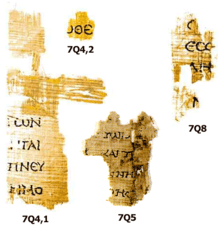1 Timothy 4
| 1 Timothy 4 | |
|---|---|
|
Fragments showing First Epistle to Timothy 2:2-6 on Codex Coislinianus, from ca. AD 550. | |
| Book | First Epistle to Timothy |
| Bible part | New Testament |
| Order in the Bible part | 15 |
| Category | Pauline epistles |
1 Timothy 4 is the fourth chapter of the First Epistle to Timothy in the New Testament of the Christian Bible. It is authored by Paul the Apostle.[1][2]
Text

- The original text is written in Koine Greek.
- Some most ancient manuscripts containing this chapter are:
- 7Q4 (Dead Sea Scrolls; AD 50-68; verses 1-3)
- Codex Sinaiticus (AD 330-360)
- Codex Alexandrinus (ca. AD 400-440)
- Codex Ephraemi Rescriptus (ca. AD 450; complete)
- Codex Freerianus (ca. AD 450; extant: verses 1-3, 10-13)
- Uncial 061 (ca. AD 450; extant: verses 1-3)
- Codex Claromontanus (ca. AD 550)
- This chapter is divided into 16 verses.
Structure
This chapter can be grouped (with cross references to other parts of the Bible):
- 1 Timothy 4:1-5 = The Great Apostasy
- 1 Timothy 4:6-11 = A Good Servant of Jesus Christ
- 1 Timothy 4:12-16 = Take Heed to Your Ministry
Verse 16
- Take heed to yourself and to the doctrine. Continue in them, for in doing this you will save both yourself and those who hear you.[3]
- Take heed unto thyself
Not as a man, or a Christian only, but as a minister; and as every minister should take heed to his life and conversation, that it be exemplary, as in 1 Timothy 4:12 to his gifts, that they be not lost, or neglected, but used and improved; to the errors and heresies abroad, that he be not infected with them; and to his flock, which is the other part of himself, that he feed it with knowledge and understanding: and to thy doctrine: preached by him, that it be according to the Scriptures, be the doctrine of Christ, and his apostles, and according to godliness; that it tend to edification, and is pure, incorrupt, and all of a piece; and that it be expressed in the best manner, with all boldness and plainness; and that he defend it against all opposition:[4]
- continue in them;
or "with them"; the members of the church at Ephesus; or rather in the doctrines of the Gospel; which should be done, though a majority is against them; though rejected by the wise, learned, and rich; though not to be comprehended by carnal reason; and though loaded with reproach and scandal; and though persecuted, yea even unto death for them:[4]
- for in doing this, thou shall both save thyself;
a minister by taking heed to himself, and doctrine, saves himself from the pollutions of the world, from the errors and heresies of false teachers, from the blood of all men, and from all just blame in his ministry.[4]
- And them that hear thee;
by being an example to them in doctrine and conversation, a minister is the means of saving and preserving those that attend on him, from erroneous principles, and immoral practices; and by faithfully preaching the Gospel to his hearers, he is instrumental in their eternal salvation; for though Jesus Christ is the only Saviour, the only efficient and procuring cause of salvation, yet the ministers of the Gospel are instruments by which souls believe in him, and so are saved; the word preached by them, being attended with the Spirit of God, becomes the ingrafted word, which is able to save, and is the power of God unto salvation; and nothing can more animate and engage the ministers of the word to take heed to themselves and doctrine, and abide therein, than this, of being the happy instruments of converting sinners, and saving them from death; see (James 5:20).[4]
See also
- Bishop
- Presbyter
- Jesus Christ
- Other related Bible parts: 1 Timothy 6, 2 Timothy 1
References
- ↑ Halley, Henry H. Halley's Bible Handbook: an abbreviated Bible commentary. 23rd edition. Zondervan Publishing House. 1962.
- ↑ Holman Illustrated Bible Handbook. Holman Bible Publishers, Nashville, Tennessee. 2012.
- ↑ 1 Timothy 4:16
- 1 2 3 4 John Gill's Exposition of the Entire Bible, - 1 Timothy 4:16
.jpg)